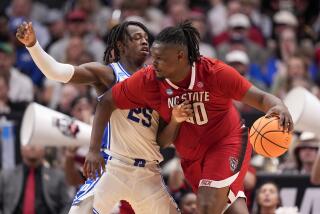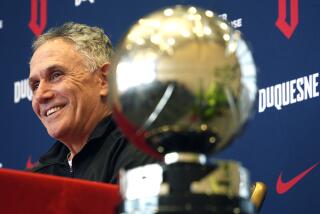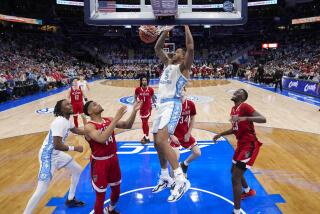NCAA MEN’S BASKETBALL TOURNAMENT : East Regional : Underdog Navy Must Duke It Out to Final Four
- Share via
EAST RUTHERFORD, N.J. — And now for the matchup everyone hadn’t been waiting for, Navy vs. Duke in today’s East Regional final, the officers against the gentlemen.
Today it may not seem so surprising, but two weeks ago it was semi-unthinkable. It flopped into the realm of the possible when Navy’s David Robinson showed in the space of tournament victories over Syracuse and Cleveland State that he was something special. His totals were 57 points, 23 rebounds, 17 blocked shots and untold new admirers.
Philadelphia 76er assistant coach Jack McMahon, asked Friday how he liked Robinson, rolled his eyes heavenward.
Said McMahon: “A guy asked me, ‘Why are you going to see him? You’re just torturing yourself.’ ”
Robinson is obligated to five years in the Navy, which means he’ll be off-limits to the NBA until 1992. Not since Elvis Presley will a U.S. armed service have taken this kind of revenue-earning potential out of our economy. Maybe the Navy could lease Robinson to a pro team like one of those lend-lease cargo ships in World War II?
The post-graduate tour and the exacting academic regimes normally restrict the academies to being competitive, at best, in college athletics. Only one other service team--Navy in 1954--has ever made the NCAA’s round of eight.
“I think it’s an incredible accomplishment,” said Duke Coach Mike Krzyzewski, who should know. Krzyzewski played at Army, where he was Bob Knight’s first captain, and later coached at West Point.
“You’re not going to always get the so-called high school All-American. You’re going to get really good players who can develop--although Paul (Evans, the Navy coach) still hasn’t told me how he got David to grow six inches and put on 40 pounds. We experimented with players at West Point, but they lost 40 pounds and shrank six inches.”
Actually, Krzyzewski, who had three Navy players sitting behind him at Saturday’s press conference, was being kind. Service academies don’t even get many really good high school players anymore. In general, they can’t hope for more than a good athlete who has no professional aspirations.
Take the second-best Navy player, 6-7, 240-pound forward Vernon Butler. He’s the Middies’ all-time leading scorer and rebounder, but as a sophomore at DeMatha High School in Hyattsville, Md., he was cut from the basketball team and joined the swim team. He transferred to another high school, where he made the basketball team and improved dramatically. When he had a great tournament game as a senior against one of the area heroes, Len Bias, Maryland Coach Lefty Driesell went back and asked his staff if they were recruiting the wrong forward.
The Terps then began to recruit Butler, who turned them down.
“You’re a white guy,” Butler said, “you’re 6-5, they have all those high school All-Americans, and you know you’re going to ride the pine. I needed to play to get better.
“My dad told me I could play at Navy. But then they tell you nine years of your life is committed. You’re 18 years old and you think, ‘Wow!’ That’s a big chunk.’ ”
The Middies have a 6-6 guard named Kylor Whitaker, who can shoot.
They are run by a 6-1 point guard named Doug Wojcik, who had better not miss.
Wojcik and a reserve named Nathan Bailey made the big mistake of missing a couple of 18-footers in Friday’s second half against Cleveland State, whereupon Evans read them the riot act during a timeout.
“Offensively, we had a few guys who thought they had been shooters who haven’t been all year,” Evans said.
Wojcik is small and slow but hangs in there. He was expected to be fighting for his life against bigger guards, like Syracuse’s Pearl Washington, or quicker ones, like the Cleveland State four, but he survived. When Washington came over to shake his hand before the blowout at Syracuse ended, Wojcik said he’d remember it the rest of his life.
Krzyzewski said of Wojcik: “I would liken him to a youngster named Pat Harris, who started for me for four years at Army. I’m sure every time they watched tapes, the opponents would say, ‘Well, he’s slow, he can’t do this, he can’t do that.’
“Then all of a sudden at the end of a game, you’d see that he had 8-10 assists, he hasn’t turned the ball over, and you’d just been beaten by the guy you thought you could beat. There has to be somebody who handles the ball, who values the basketball, who gets the ball to people like Robinson, Butler and Whitaker.”
More to Read
Go beyond the scoreboard
Get the latest on L.A.'s teams in the daily Sports Report newsletter.
You may occasionally receive promotional content from the Los Angeles Times.










